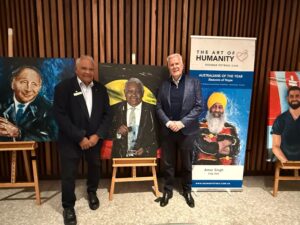 Article
Article
July 28, 2025
Message from the TIS National Coordinator, Prof Tom Calma AO
As we round out another busy month in the Tackling Indigenous Smoking (TIS) program, I am once again reminded of the commitment of our workforce. Whether through education sessions in remote communities or bold social campaigns reaching younger audiences, the work of TIS staff across the country continues to be critical to the health of Aboriginal and Torres Strait Islander peoples.
This month celebrating NAIDOC Week and welcoming a new Parliament also brings particularly encouraging news.
From 1 July, funding for TIS will now be drawn from the National Tobacco Excise Fund, alongside investment in the new lung cancer screening program. This shift represents a significant win for the sector. It not only affirms the importance of tobacco control as a public health priority, it also relieves some of the pressure on consolidated government budgets, potentially freeing up funding for other vital Aboriginal and Torres Strait Islander health programs.
Even more importantly, this funding has now been indexed. For the TIS network, this offers the capacity to grow, something we have long advocated for. Indexation provides the stability needed to plan, recruit and innovate with confidence. It reflects a maturing of the program and greater recognition of the value of TIS by government.
With this longer term funding comes responsibility. It’s vital that TIS teams on the ground continue to spend allocated funds on their approved and ongoing projects. Unused funds can limit the momentum we’ve built and worse still impact future funding allocations. I urge all TIS funded organisations to continue delivering their programs with impact, confidence and purpose.
We are now looking ahead to the 2025 National TIS CEO Workshop, taking place on 2 September in Sydney. This is a key opportunity for CEOs and senior leaders to engage directly with the Department of Health, Disability and Ageing, the National Evaluators the NBPU team and myself.
I strongly encourage all teams to raise any risk or operational issues in advance of the workshop. Your insights help shape future improvements and ensure that decision makers hear what’s really happening on the ground. These can be submitted anonymously to the NBPU and I hope you’ll take advantage of the opportunity. As I mentioned at the national gathering any concerns raised by teams will be presented to the CEOs without identifying the source or location of the concern as most concerns would be commonly experienced across the regions.
The selection process for the next round of the National Reach and Resilience Program (NRPP) is progressing well. We are working closely with the Department to finalise selections and anticipate announcements in the coming months. The level of interest and quality of applications reflect the sector’s hunger for innovation and responsiveness to local needs. We look forward to supporting new and continuing projects under this important scheme.
I had the privilege of presenting at the International Life Course Conference in Brisbane. My presentation focused on the importance of supporting communities to lead their own health outcomes, with a specific focus on young people and women of childbearing age.
We know that early intervention and a life course approach to health, incorporating physical, mental, emotional and spiritual wellbeing can create generational change. I spoke about the value of cultural knowledge, language and community led practice and how these strengthen the resilience of families and improve outcomes for children. These are not just health strategies, they are nation building investments.
On July 30, I will deliver the Deakin University Indigenous Oration, which will be livestreamed into Federation Square, where over 550 people have registered to attend. It is an honour to be invited to speak at this scale and to share reflections on leadership, health equity and justice for First Nations peoples. My message will centre on the importance of truth telling, genuine partnerships and self determination as foundational to our nation’s future. When the recording of the Oration is released publicly I will share the link
As Chair of the Advisory Board for the Centre of Excellence in Indigenous Futures, I continue to advocate for placing communities at the heart of research and decision making. This means elevating local voices, investing in community led data practices and shifting the power dynamics that have long sidelined our people from conversations about our own futures. In all of the three mentioned presentations I highlight and encourage that the approach we take with TIS to empower and build the capacity of the community to be self-determining and in control of the services and messaging that resonates best for their community.
Finally, I was humbled to attend the recent launch of George Petrou’s latest book, The Art of Humanity, at the Australian War Memorial. The book profiles 40 Australians who have made contributions in the service of others. To be included among the 40 is deeply moving.
As part of this recognition I was gifted $10,000 to go towards a charity of my choice, I donated to the University of Canberra, and committed to match the donation for a scholarship fund for veterans and reservist to participate in a PTSD short course at UC. Supporting their healing and future is a responsibility I gladly share.
We often speak about systems change, but at the heart of that is people in communities, people in programs and people with the vision to see a different future. Let us continue to walk alongside each other, grounded in culture, driven by evidence and unified in purpose.
Professor Tom Calma AO
FANZSOG FAA FASSA FAHA
National Coordinator Tackling Indigenous Smoking

